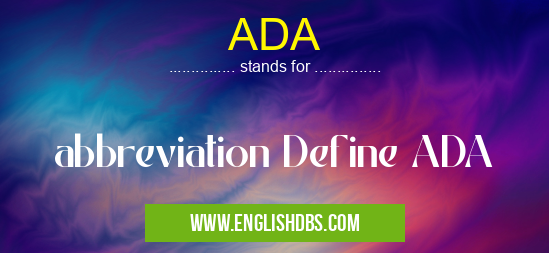What does ADA mean in UNCLASSIFIED
ADA is the popular acronym for the Americans with Disabilities Act, which was signed in 1990 by President George H. W. Bush to prohibit discrimination against individuals with disabilities. This groundbreaking civil rights law works to ensure that people with disabilities can enjoy equal opportunity and access to employment, public accommodations, transportation, state and local government services, and telecommunications. The ADA is enforced by several federal agencies including the Equal Employment Opportunity Commission (EEOC), Department of Justice (DOJ), Department of Transportation (DOT), and Department of Education (ED).

ADA meaning in Unclassified in Miscellaneous
ADA mostly used in an acronym Unclassified in Category Miscellaneous that means abbreviation Define ADA
Shorthand: ADA,
Full Form: abbreviation Define ADA
For more information of "abbreviation Define ADA", see the section below.
Definition
The Americans with Disabilities Act is a comprehensive civil rights law designed to protect individuals with disabilities from discrimination. It ensures them access to employment opportunities and public accommodations on an equal basis with those without disabilities. It also requires employers to provide reasonable accommodations so individuals with a disability can participate fully in the workplace. Additionally, it prohibits discrimination based on disability in state and local government services such as transportation and telecommunications.
Essential Questions and Answers on abbreviation Define ADA in "MISCELLANEOUS»UNFILED"
What does ADA stand for?
ADA stands for Americans with Disabilities Act, a civil rights law passed in 1990 that prohibits discrimination against individuals with disabilities and guarantees them equal opportunities.
What are the main goals of ADA?
The primary goal of the Americans with Disabilities Act is to ensure that people with disabilities have the same rights and opportunities as everyone else. This includes providing access to employment, transportation, public accommodations, and telecommunications.
Who is protected under the Americans with Disabilities Act (ADA)?
The ADA protects individuals who have a physical or mental impairment that substantially limits one or more major life activities. Some examples of covered impairments include hearing loss, mobility issues, visual impairments, intellectual disabilities, and chronic health conditions.
What are some specific examples of accommodations provided under the Americans with Disabilities Act (ADA)?
Under the ADA, employers may be required to provide reasonable accommodations such as accessible work stations, voice amplifiers/interpreters in meetings that require verbal communication, modified job duties/schedules that enable an employee to remain employed while dealing with a disability-related challenge. Other common accommodations include providing accessible entrances/exit ramps and providing wheelchair-accessible spaces in order to ensure that people with disabilities can enter public buildings. Other popular examples include designated parking spots for disabled individuals and wheelchair lifts on public transportation buses.
Does the ADA apply only to employers?
No. While the ADA does protect employees from being discriminated against by their employers due to disability, it also applies to other areas of life such as public transportation services and places of public accommodation including restaurants, hotels/motels and movie theaters among many others.
Are there any exceptions to the Americans with Disabilities Act (ADA)?
Generally speaking, no - organizations must comply with all aspects of the law without exception; however employers may be able offer preferential treatment based on disability status if they choose so long as it complies with all other laws related to granting preference due to disability status..
Does my organization need to make structural changes in order to comply with the ADA?
In some cases yes - organizations may have to make structural changes depending on their situation; however these obligations can be met through various strategies such as simply providing auxiliary aids or obtaining flexibility in how services are provided rather than making costly structural modifications..
Final Words:
The Americans with Disabilities Act is a powerful law that helps ensure equal opportunity for people with all kinds of disabilities in the United States, allowing them to live independent lives and find meaningful employment in their chosen fields. Its importance cannot be overstated as it has led to dramatic increases in accessibility for countless individuals and helped create more inclusive workplaces across the country. Whether you're an employer or employee, landlord or tenant, business owner or customer — understanding this crucial piece of legislation is essential for ensuring everyone's rights are respected.
ADA also stands for: |
|
| All stands for ADA |
